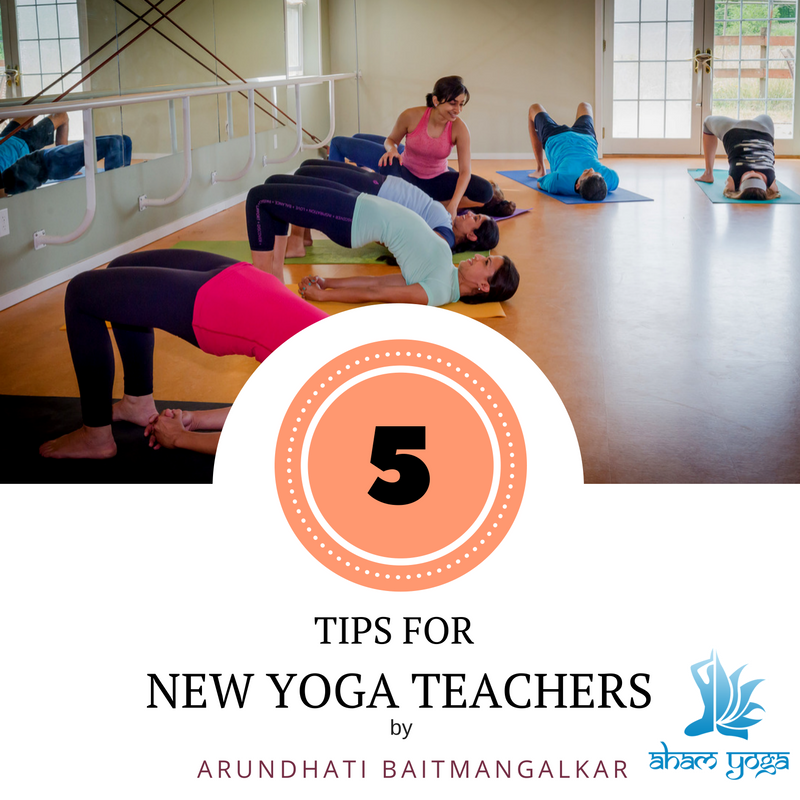-
No substitute for real learning & knowledge
-
What are your roots?
-
Practice before you teach.
-
Understand your goal or motivation.
-
Re-evaluate yourself – constantly!

5 tips for new yoga teachers by Arundhati Baitmangalkar
-
No substitute for real learning & knowledge :
What do most well known yoga teachers have in common? They have spent years learning and developing their skill set! Yoga, as a system, takes time and requires effort. In our modern age, social media dictates a large part of how yoga appears to the common man. Many new yoga teachers get drawn into this ‘fancy’ yet false appeal of yoga, portraying it as something cool, mystical, trendy, and for the super flexible, often selling short on the entirety of yoga. In fact, all that yoga is is a discipline. Yoga is a way of life. It is meant to be as synonymous to us just as brushing our teeth or combing our hair is. To be really successful in teaching/imparting or sharing yoga, one needs to be careful as to where to draw the line. Being a yoga teacher, one bares the responsibility to transmit this ancient wisdom on to others and help keep the passage of knowledge and time going. To be the best yoga teacher one can be, one has to strive towards learning more – yoga poses, therapeutics, and yoga philosophy. This knowledge can be found through good books or studying with yoga masters. For a rare few, self learning is a great way to go. In the west, modern yoga teachers take on the role of counselors during a yoga class. This however, is unnecessary and not yogic.
-
What are your roots?
We now have so many new and varied styles and fads of yoga available. As you begin to learn yoga or start yoga teacher training, decide what your roots will be. Be warned as this may take some time. By your roots, I am referring to your intention. All of us have different intentions depending on our own experiences. The best way to excel at being a yoga teacher is to decide on what your roots are and how you are going to use that to your advantage. Being sure of your roots will help you walk on one yoga path really well rather than be confused and hop around from one type of yoga to another and never really settling as a yoga teacher. This will allow you to expand your knowledge and absorb yourself in your practice and teaching.
-
Practice before you teach:
I had already been teaching dance for several years before I started teaching yoga. Nonetheless, I was always nervous in my initial days of teaching yoga and always prepared. Sometimes probably even over prepared. I only taught asana classes back then, but always made it a point to make a yoga sequence, practice it several times before teaching it. Not just physically, but also what I would say and how I would say it. I even made options for some poses that i anticipated people having some difficulty with. My instructions got better as I paid more attention to my own body in the yoga poses and what my experience was like. I supplemented this by reading a lot on those yoga poses. Being prepared helped me to not get caught off guard in class, and as a result I was able to handle multiple levels and needs in a single class.
-
Understand your goal or motivation:
What is your motivation behind wanting to teach yoga? What is your goal? Try to go beyond the, “I love yoga and it is my passion” reasoning. While teaching yoga to others, we have a certain role and responsibility for the duration of that hour. By becoming clear on the real motivation behind passing on yogic wisdom, we slowly groom ourselves into becoming better yoga teachers and human beings. Understanding this will give rise to clarity and a clear conscience when teaching yoga. Is your goal to serve, teach and pass on good yogic wisdom or is it entirely self-generated? Looking for this clarity will also help draw like minded practitioners towards you. By making and chasing goals, the journey becomes more tangible, realistic and helps to keep track of our growth. The important thing to remember is it is not about ‘you’.
-
Re-evaluate yourself constantly:
This is for any yoga teacher, and not just for the newer ones. To constantly keep tab of your own progress is critical. That is if you want to grow as a yoga teacher. I have met plenty of teachers who are happy just being where they are. But if you are driven to learn, share and do more, than constantly evaluating your progress as both a yoga teacher and student will help you stay focussed and away from distractions. By intentionally creating opportunities for self growth, one is upholding the ancient principles of svadhyaya (selfstudy) and keeping the flame of yogic knowledge going. After all, teaching comes with a set of
responsibilities.

